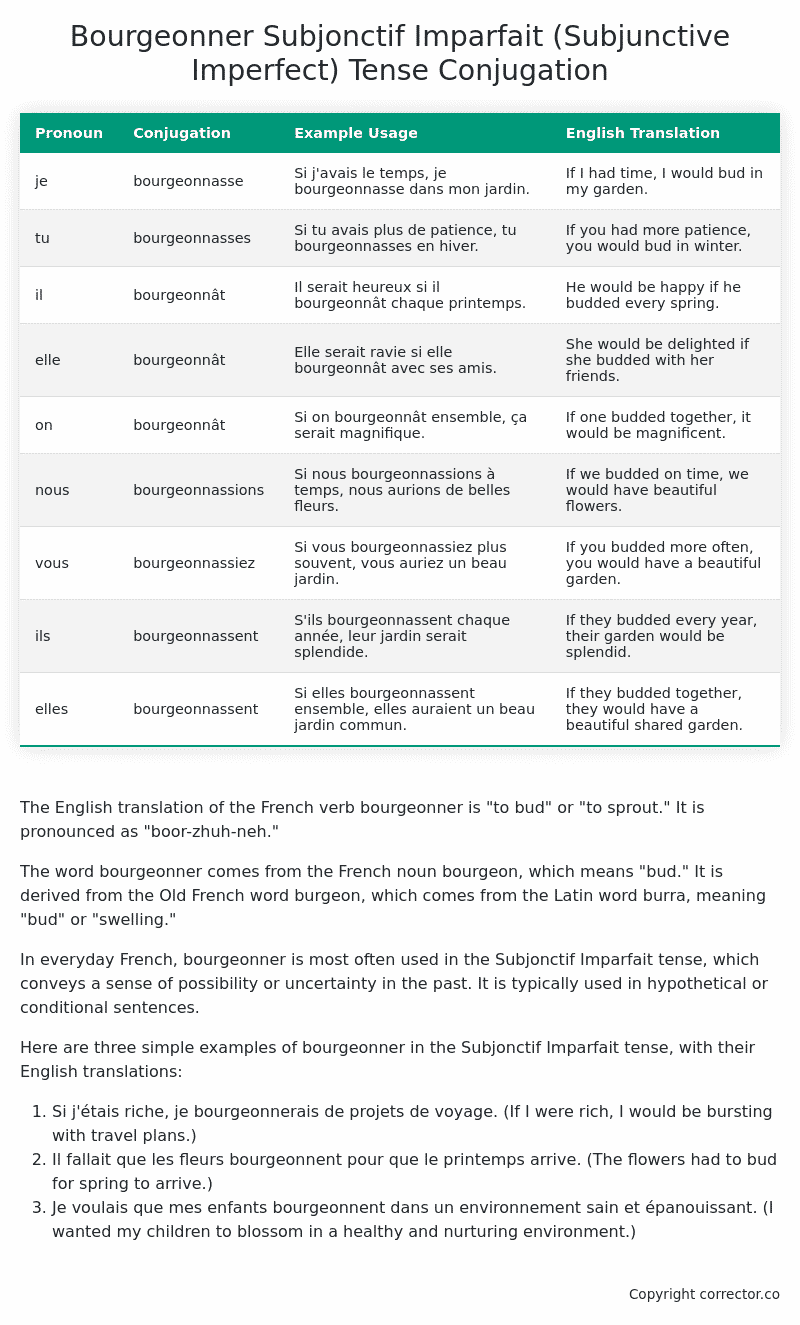Subjonctif Imparfait (Subjunctive Imperfect) Tense Conjugation of the French Verb bourgeonner
Introduction to the verb bourgeonner
The English translation of the French verb bourgeonner is “to bud” or “to sprout.” It is pronounced as “boor-zhuh-neh.”
The word bourgeonner comes from the French noun bourgeon, which means “bud.” It is derived from the Old French word burgeon, which comes from the Latin word burra, meaning “bud” or “swelling.”
In everyday French, bourgeonner is most often used in the Subjonctif Imparfait tense, which conveys a sense of possibility or uncertainty in the past. It is typically used in hypothetical or conditional sentences.
Here are three simple examples of bourgeonner in the Subjonctif Imparfait tense, with their English translations:
- Si j’étais riche, je bourgeonnerais de projets de voyage. (If I were rich, I would be bursting with travel plans.)
- Il fallait que les fleurs bourgeonnent pour que le printemps arrive. (The flowers had to bud for spring to arrive.)
- Je voulais que mes enfants bourgeonnent dans un environnement sain et épanouissant. (I wanted my children to blossom in a healthy and nurturing environment.)
Table of the Subjonctif Imparfait (Subjunctive Imperfect) Tense Conjugation of bourgeonner
| Pronoun | Conjugation | Example Usage | English Translation |
|---|---|---|---|
| je | bourgeonnasse | Si j’avais le temps, je bourgeonnasse dans mon jardin. | If I had time, I would bud in my garden. |
| tu | bourgeonnasses | Si tu avais plus de patience, tu bourgeonnasses en hiver. | If you had more patience, you would bud in winter. |
| il | bourgeonnât | Il serait heureux si il bourgeonnât chaque printemps. | He would be happy if he budded every spring. |
| elle | bourgeonnât | Elle serait ravie si elle bourgeonnât avec ses amis. | She would be delighted if she budded with her friends. |
| on | bourgeonnât | Si on bourgeonnât ensemble, ça serait magnifique. | If one budded together, it would be magnificent. |
| nous | bourgeonnassions | Si nous bourgeonnassions à temps, nous aurions de belles fleurs. | If we budded on time, we would have beautiful flowers. |
| vous | bourgeonnassiez | Si vous bourgeonnassiez plus souvent, vous auriez un beau jardin. | If you budded more often, you would have a beautiful garden. |
| ils | bourgeonnassent | S’ils bourgeonnassent chaque année, leur jardin serait splendide. | If they budded every year, their garden would be splendid. |
| elles | bourgeonnassent | Si elles bourgeonnassent ensemble, elles auraient un beau jardin commun. | If they budded together, they would have a beautiful shared garden. |
Other Conjugations for Bourgeonner.
Le Present (Present Tense) Conjugation of the French Verb bourgeonner
Imparfait (Imperfect) Tense Conjugation of the French Verb bourgeonner
Passé Simple (Simple Past) Tense Conjugation of the French Verb bourgeonner
Passé Composé (Present Perfect) Tense Conjugation of the French Verb bourgeonner
Futur Simple (Simple Future) Tense Conjugation of the French Verb bourgeonner
Futur Proche (Near Future) Tense Conjugation of the French Verb bourgeonner
Plus-que-parfait (Pluperfect) Tense Conjugation of the French Verb bourgeonner
Passé Antérieur (Past Anterior) Tense Conjugation of the French Verb bourgeonner
Futur Antérieur (Future Anterior) Tense Conjugation of the French Verb bourgeonner
Subjonctif Présent (Subjunctive Present) Tense Conjugation of the French Verb bourgeonner
Subjonctif Passé (Subjunctive Past) Tense Conjugation of the French Verb bourgeonner
Subjonctif Imparfait (Subjunctive Imperfect) Tense Conjugation of the French Verb bourgeonner (this article)
Conditionnel Présent (Conditional Present) Tense Conjugation of the French Verb bourgeonner
Conditionnel Passé (Conditional Past) Tense Conjugation of the French Verb bourgeonner
L’impératif Présent (Imperative Present) Tense Conjugation of the French Verb bourgeonner
L’infinitif Présent (Infinitive Present) Tense Conjugation of the French Verb bourgeonner
Struggling with French verbs or the language in general? Why not use our free French Grammar Checker – no registration required!
Get a FREE Download Study Sheet of this Conjugation 🔥
Simply right click the image below, click “save image” and get your free reference for the bourgeonner Subjonctif Imparfait tense conjugation!

Bourgeonner – About the French Subjonctif Imparfait (Subjunctive Imperfect) Tense
Formation
Common Everyday Usage Patterns
Interactions with Other Tenses
Subjonctif Présent
Indicatif Passé Composé
Conditional
Conditional Perfect
Summary
I hope you enjoyed this article on the verb bourgeonner. Still in a learning mood? Check out another TOTALLY random French verb conjugation!


